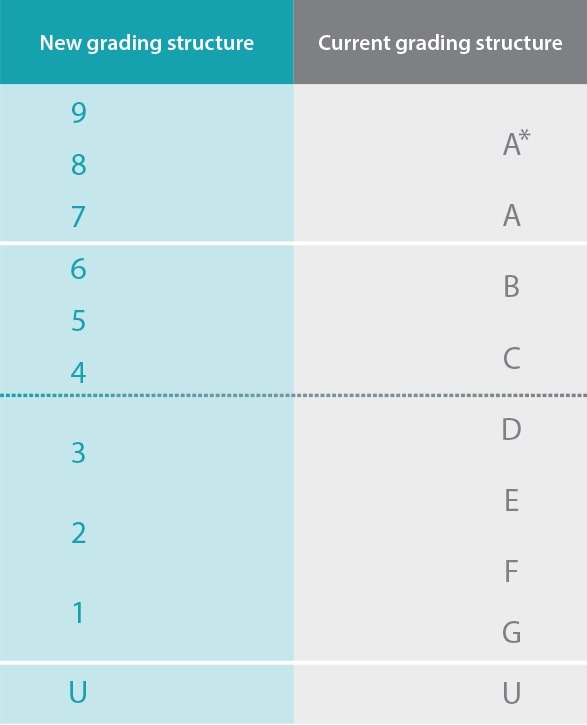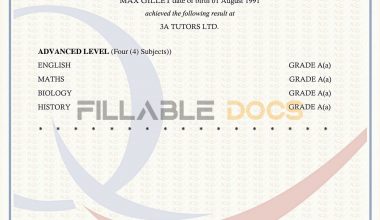Results day in England Ireland, and Northern Wales is when students receive their grades for A-level exams. A pass grade at GCSE (General Certificate of Secondary Education) and A Level examinations is a significant milestone in a student’s academic journey.
Those who scale through the pass grade are wholesomely excited and ready to conquer more milestones. However, those who do not may be overwhelmed with sadness and what failing means to their future. Since there are different grades in A-level results, you may wonder “What is a Pass Grade?”
This article analyses what a pass grade is in GCSE. It also reviews the grading system of GCSE and A Level exams.
If you read to the end, you will gain clarity on what score is considered a pass and how to resit an exam if you do not meet the pass grade.
Table of contents
What is A Grading System?
A grading system is a standardized method used by educational institutions to assess and evaluate a student’s performance in a course or subject. It assigns a numerical or letter grade to represent the level of achievement or proficiency demonstrated by the student in their coursework, assignments, and examinations.
The grading system serves as a measure of the student’s understanding, knowledge, and skills in a particular area of study.
In most grading systems, higher grades typically indicate better performance, while lower grades suggest areas where improvement may be needed. While there are various types of grading systems, numerical and letter grading are more prominently used.
Read Also: GCSEs or GCSE’s: Which is Correct and Why?
What is the GCSE Grading System
The GCSE grading system in England, Wales, and Northern Ireland is a numerical system from 9 to 1, with 9 being the highest grade and 1 being the lowest grade. The grades are awarded based on a student’s performance in their GCSE exams.
This grading system qGCSEs employ a grading system ranging from 9 to 1, with 9 being the highest and 1 the lowest. Grades 7, 8, and 9 are equivalent to the old A* grade, while grades 4 to 6 are comparable to the previous grade C. Grades 1, 2, and 3 signify a standard pass, while grades U (Unclassified) and G (Fail) denote a non-pass.
The grade boundaries for each subject are set by the exam boards, and they can vary from year to year. However, in general, a grade 4 in a GCSE subject requires students to demonstrate a good understanding of the subject content and to be able to apply their knowledge to answer questions.
Here is a table showing the GCSE grading system:

Read Also: How to Be Fully Prepared for GCSE Results Day in 2024
What is A Pass Grade in GCSE?
A pass grade in GCSE is a grade 4 or above. This is considered a standard pass. A grade 5 is considered a strong pass, and a grade 6 or above is considered an excellent pass.
To achieve a pass grade in GCSE, you must demonstrate a good understanding of the subject content and be able to apply your knowledge to answer questions. This may involve being able to recall facts, solve problems, and write clear and concise essays.
The grade boundaries for each subject are set by the exam boards, and they can vary from year to year. However, in general, a grade 4 in a GCSE subject requires students to demonstrate a good understanding of the subject content and to be able to apply their knowledge to answer questions.
A passing grade in GCSE is important because it demonstrates to universities and employers that a student has the basic skills and knowledge required to succeed in further study or employment.
Here are some of the benefits of achieving a pass grade in GCSE:
- You will be eligible to apply for most apprenticeships and jobs.
- You will be able to progress to A-level or equivalent courses.
- You will have a better chance of being accepted into higher education.
- You will be able to demonstrate to employers that you have the basic skills and knowledge required to succeed in further study or employment.
Read Also: What is a Placement Year at University?
How are the GCSE grade boundaries worked out?
The GCSE grade boundaries are worked out by the exam boards in collaboration with teachers and other experts. The process is complex and involves several factors, including:
- The difficulty of the exam papers
- The performance of students in previous years
- The expectations of employers and universities
The grade boundaries are set so that a certain percentage of students achieve each grade. For example, the grade boundary for a grade 5 in a particular subject may be set so that 60% of students achieve that grade.
The grade boundaries are not published until after the exams have been taken. This is to prevent students from gaming the system by focusing on certain questions or topics.
Here is a simplified overview of how the GCSE grade boundaries are worked out:
- The exam boards collect data on the performance of students in previous years. This data includes the percentage of students who achieved each grade in each subject.
- The exam boards use this data to set a target for the percentage of students who should achieve each grade in each subject.
- The exam boards then use this target to set the grade boundaries for each subject.
- The grade boundaries are reviewed each year to ensure that they are fair and accurate.
What is A Level Grading System?
A Levels operate on an A* to E grading scale, with A* being the highest and E the lowest passing grade. Achieving an E grade demonstrates a basic understanding of the subject matter.
The A Level grading system is a method used in the United Kingdom and several other countries to assess and evaluate a student’s performance in advanced-level courses. A Levels are typically taken by students in the final two years of their pre-university education and are a crucial factor in university admissions.
In the A Level grading system, students are assigned grades from A* to E, with A* being the highest and E the lowest passing grade. Each grade represents a specific level of achievement and proficiency in the subject.
Here is a breakdown of the A Level grading system:
- *A (A-star)**: This is the highest achievable grade and indicates exceptional performance.
- A: This grade represents a very high level of achievement and is also considered excellent.
- B: This grade indicates a good level of performance.
- C: This grade signifies a satisfactory level of achievement.
- D: This grade suggests a basic understanding of the subject, but with some areas that may need improvement.
- E: This is the lowest passing grade
- U (Unclassified): This grade is assigned when a student’s performance does not meet the minimum requirements for a pass.
Read Also: How Do I Get my GCSE Results in 2024?
What is a Pass Grade in A Levels?
A pass grade in A-level is a grade C or above. This is considered a standard pass. A grade A is considered a strong pass, and a grade A* is considered an excellent pass.
To achieve a pass grade in A-level, students must demonstrate a good understanding of the subject content and be able to apply their knowledge to answer questions at a high level.
The grade boundaries for each subject are set by the exam boards, and they can vary from year to year. However, in general, a grade C in an A-level subject requires students to demonstrate a good understanding of the subject content and be able to apply their knowledge to answer questions at a high level.
A Level pass grades open doors to various educational and career pathways. They are often the key requirement for admission to universities and colleges.
What Happens If I don’t meet GCSE Pass Grade?
Pass grades serve as a foundation for higher education. They provide students with the necessary qualifications to pursue their chosen fields of study at advanced levels.
If you do not meet the GCSE pass grade in one or more subjects, it’s important to understand how this might affect your progression in education or career. Here are some potential scenarios and steps you can take:
- Re-sitting Exams:
- Many educational institutions offer opportunities to re-sit GCSE exams. This allows you to improve your grades and achieve the necessary pass grades.
- Alternative Qualifications:
- There are several alternative qualifications that you can take if you do not meet the GCSE pass grade. These qualifications include BTECs, NVQs, and apprenticeships.
- Vocational Courses:
- Explore vocational courses, apprenticeships, or training programs. These pathways may have different entry requirements and can lead to specific careers. There are apprenticeships available in a wide range of industries, including construction, engineering, healthcare, and hospitality.
- Skill Development:
- Focus on developing practical skills and gaining experience through internships, workshops, or volunteer work. This can be valuable instead of formal qualifications.
What Happens If I don’t meet A Level Pass Grade?
Not meeting the A-level pass grade does not mean that you cannot be successful. Many people have gone on to have successful careers without having A-levels.
Here are some specific options for progression if you do not meet the A-level pass grade:
- Apprenticeships: Apprenticeships are a great way to learn a trade or profession while you earn a salary. There are apprenticeships available in a wide range of industries, including construction, engineering, healthcare, and hospitality.
- Vocational courses: Vocational courses are designed to give you the skills and knowledge you need to get a job in a specific industry. These courses are typically shorter than A-levels and can be taken at a college or training provider.
- Basic Skills courses: Basic Skills courses can help you to improve your literacy and numeracy skills. These courses are typically offered at a college or training provider.
- Entry-level jobs: There are a number of entry-level jobs that do not require A-levels. These jobs may include customer service, retail, and hospitality.
Is There a Difference Between GCSE and A level Grading System?
Yes, there are some key differences between the GCSE grading system and the A-level grading system in England, Wales and Northern Ireland. The GCSE grading system is more lenient than the A-level grading system. This is because GCSEs are intended to be more general qualifications that provide students with a basic level of knowledge and skills.
A-levels, on the other hand, are intended to be more specialized qualifications that prepare students for further study or employment in a particular field.
GCSE grading system
- A numerical grading system from 9 to 1, with 9 being the highest grade and 1 being the lowest grade.
- To pass a GCSE, a student must achieve a grade 4 or above.
- A grade 5 is considered a strong pass, and a grade 6 or above is considered an excellent pass.
- The grade boundaries for each subject are set by the exam boards, and they can vary from year to year.
A-level grading system
- A letter grade system from A* to U, with A* being the highest grade and U being the lowest grade.
- To pass an A-level, a student must achieve a grade C or above.
- A grade A is considered a strong pass, and a grade A* is considered an excellent pass.
- The grade boundaries for each subject are set by the exam boards, and they can vary from year to year.
Other key differences
- GCSEs are typically taken by students aged 14-16, while A-levels are typically taken by students aged 16-18.
- GCSEs are more general qualifications, while A-levels are more specialized qualifications.
- GCSEs are typically required for entry into most apprenticeships and jobs, while A-levels are typically required for entry into higher education.
Frequently Asked Questions
Yes, it is possible to retake GCSE or A Level exams to improve your grades. Many educational institutions offer opportunities for re-sitting exams.
Pass grades can be sufficient for certain vocational or technical courses, but for admission to most universities, higher grades are typically required.
No, any grade below a 4 in the 9-1 grading system will be registered as a fail.
The Government has said that grade 4 is a ‘standard pass’.
This refers to a grade of 4, which is also a pass.
Conclusion
Attaining a passing grade in GCSE and A level is a commendable achievement, useful for laying a foundation for future academic and professional careers. It can open doors of diverse opportunities for you.
References
- Third Space Learning.com – GCSE Grade Boundaries 2023/2024: The New Grading System Explained
- BBC.com – GCSE grades 2024: The 9-1 boundaries explained
- AQA.org.UK – Grading






